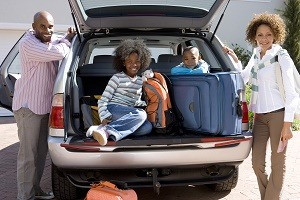
The summer months see some of the most traffic of the entire year. Great weather and vacation time leads many families and groups to pack up the car and head out on an adventure. If you are planning a road trip this summer, check out these road trip safety tips to help make sure everyone has a safe and enjoyable time.
Before you start your journey, develop a plan. First is the important task of deciding where to go. While spontaneous trips are great, having at least a rough idea of your route and final destination will allow you to plan for rest breaks and fuel stops.
Make sure every driver in your caravan has both an electronic and a physical map and list of directions. This way if you enter an area with low GPS signal or no cell phone connectivity you will still know where you are headed.
An emergency kit will help you prepare for the little hazards of road trips. If you already have an emergency kit in your vehicle, check to make sure everything is fresh and ready to go. Remember that batteries can go bad even when not in use and you should be replacing provisions at least once a year.
In addition to an emergency kit, make sure you have a spare tire in the car.
The most important skill to master when driving long distances is the ability to block out all distractions and focus solely on driving. Hand your cell phone and the task of controlling the radio and air conditioning to your passenger. Doing so will allow you to keep both hands on the wheel, and your mind and eyes focused on the road.
We all know how exciting a road trip with your friends and family can be, but limit your conversations and interactions until you reach your destination as passengers can be just as distracting as cell phones.
Strict concentration on the road can be tiring, especially on roads with little traffic. At the first sign of fatigue, take a rest break to stretch, use the bathroom, or grab a snack. If you have other drivers in the car, set up a shift system, so everyone has a chance to switch off and rest for a while. If you are the only driver, plan on several stops for at least 10 minutes to stretch and freshen up before hitting the road.
Make sure you have the numbers of your roadside assistance provider written down in your trip notes. Even if you lose cell phone power or signal, if you can find a payphone you can get in contact for whatever mechanical issues you face. If you become lost, find a local gas station or restaurant to ask for directions rather than getting frustrated and fatigued looking for the correct route.